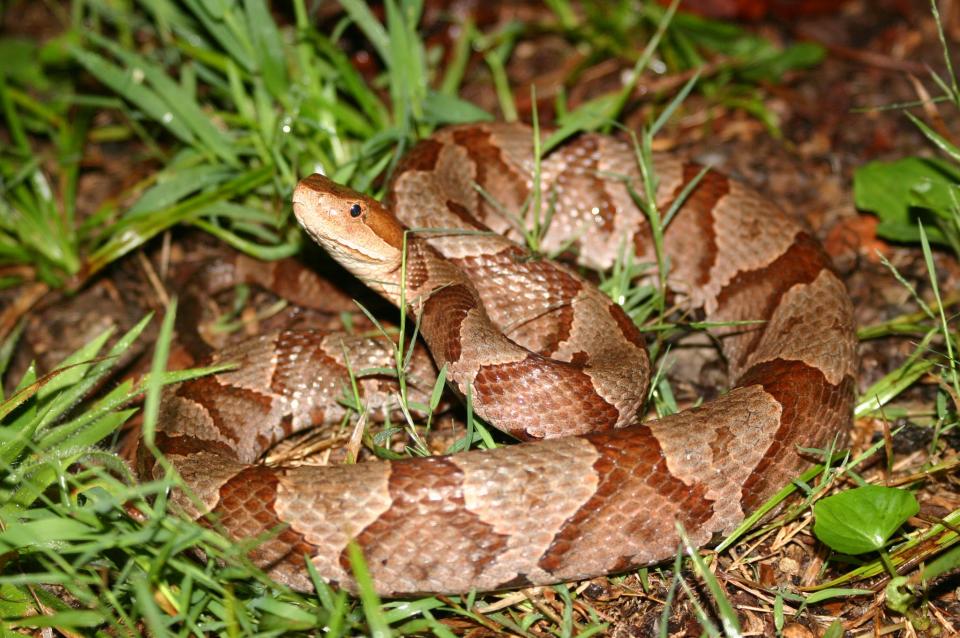Do cicadas really attract copperheads? What to know about emergences in Asheville area
As many North Carolina residents know by now, periodical cicadas are joining the usual annual chorus this year across the state — and the buzz of curiosity about the potential swarms is going strong.
One question in particular has concerned those who are less than thrilled about the emergence set to begin in mid-May: Are venomous copperhead snakes expected to join the cicadas this year?
Experts weigh in on the unsettling prospect, and offer more info on cicadas in the region and nationwide.
More: Cicadas 2024: Will a cold snap delay the emergence of cicadas? When will they emerge?
Do cicadas attract copperhead snakes?

Previous reporting from the Mississippi Clarion Ledger offers some insight. Mississippi herpetologist Terry Vandeventer told Clarion Ledger reporter Brian Broom the answer is yes, but not to the degree some are concerned about.
"It's fear-mongering greatly, greatly blown out of proportion," Vandeventer said. "There's a lot of truth to it, the thing is the fear-mongering on social media."
Vandeventer also said that copperheads may be interested in eating cicadas for the amount of nutrients they contain.
"They're really rich in protein," Vandeventer said. "They have more protein than a mouse."
"It's a favorite food," Vandeventer said. "They love them. It's an easy meal with a lot of bang for their buck. Copperheads eat a lot of bugs. They eat cicadas, they eat katydids, they eat caterpillars. Again, it's protein."
More: Word from the Smokies: Fireflies are surprisingly diverse
Piles of copperheads under trees?
As for reports of multiple copperheads around a single tree laying in wait for tasty cicadas, Vandeventer said it does happen, but the likelihood of it is slim.
"Very few people have had the opportunity to witness this," Vandeventer said. "I've never seen it."
"It's rare to see these large aggregations under trees. It's incredibly rare. When they do, they report it to a newspaper or a radio station and it gets blown up bigger than it really is."
Vandeventer gave simple advice on what to do if you encounter a copperhead during the emergence; Or at any other time.
"Take two steps back and walk away."
More: Are there 'murder hornets' in North Carolina? What to know about the Asian giants.
When will the cicadas emerge?
While many areas of N.C. have already seen emergences of annual and periodical cicadas, reports have been scarce in the western region of the state. So, why haven't we seen the red-eyed insects yet? The answer is simple enough: WNC isn't a hotspot for annual cicadas, for one. Additionally, emergences rely on soil temperature, which rises slower at higher altitudes like the ones in Asheville and other WNC areas.
The 13-year Brood XIX cicadas are expected to emerge in largest numbers around mid-May and continue their signature drone through late June. Emergences are often triggered by a warm rain. This is one of several big differences between periodical cicadas and their annual "dog-day" cicada counterparts, which emerge later in July and August.
Are cicadas harmful to humans?
The loud buzz cicadas produce can be a bit alarming, but they don't actually bite or sting. However, Cicada Mania, a site dedicated to cicadas, explains that they can "pierce and suck."
This is because unlike wasps, ants and other insects, cicadas do not have stingers or mandibles built for biting and tearing flesh. Cicadas drink tree fluids using sucking mouthparts, and while they might occasionally mistake a human for a tree, cicadas are not drawn to blood. Cicada Mania says that, in fact, it would likely prove poisonous to them if they were to attempt to drink human blood.
Cicada Mania also suggested that, if you want to avoid cicadas, you should avoid using power tools, drills, saws, lawn mowers, weed whackers, leaf blowers, etc., in their presence, as they may mistake the sounds made by these tools for other cicadas.
More: Synchronous fireflies in Great Smoky Mountains: 2024 viewing lottery, dates announced
What are Brood XIX cicadas?
Brood XIX cicadas have a 13-year life cycle. They last emerged in 2011, and are estimated to emerge again in many states beginning mid-May. You'll hear them droning through late June, according to Cicada Mania. The "Great Southern Brood" will emerge in these states:
Alabama
Arkansas
Georgia
Illinois
Indiana
Kentucky
Louisiana
Mississippi
Missouri
North Carolina
Oklahoma
South Carolina
Tennessee
Virginia
Iris Seaton is the trending news reporter for the Asheville Citizen Times, part of the USA TODAY Network. Reach her at [email protected].
This article originally appeared on Asheville Citizen Times: Do cicadas attract copperheads? Brood XIX in Asheville area to emerge
